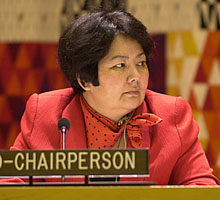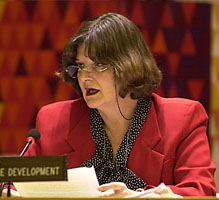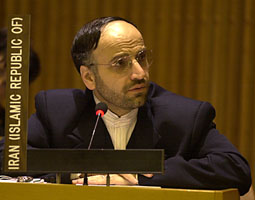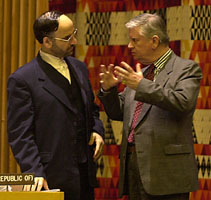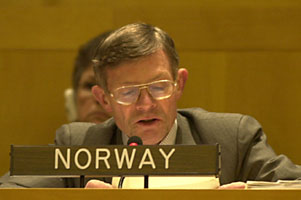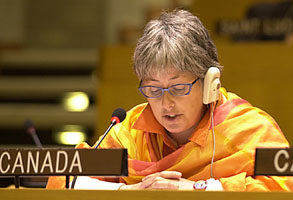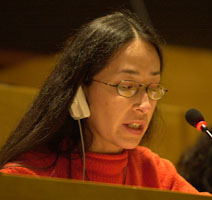| |
 JoAnne
DiSano, Director,
UN Division on Sustainable Development, introduced
the Secretary General's Report on International Cooperation for
an Enabling Environment for Sustainable Development (E/CN.17/2001/5).
She noted that the report focuses on the implications for sustainable
development of the major changes in the international environment
as a result of globalization, and examines initiatives to ensure
all countries benefit from globalization through international
cooperation.
JoAnne
DiSano, Director,
UN Division on Sustainable Development, introduced
the Secretary General's Report on International Cooperation for
an Enabling Environment for Sustainable Development (E/CN.17/2001/5).
She noted that the report focuses on the implications for sustainable
development of the major changes in the international environment
as a result of globalization, and examines initiatives to ensure
all countries benefit from globalization through international
cooperation.
|
|
 Iran,
for the G-77/China, described
the increasing disillusionment among policy makers about globalization
due to, inter alia, the lack of tangible benefits to, and social
dislocation in, many developing countries. He identified actions
that could be supportive to sustainable development objectives,
including: accelerating debt reduction for highly indebted countries;
reversing the decline of ODA flows; and enhancing access to developed
country markets.
Iran,
for the G-77/China, described
the increasing disillusionment among policy makers about globalization
due to, inter alia, the lack of tangible benefits to, and social
dislocation in, many developing countries. He identified actions
that could be supportive to sustainable development objectives,
including: accelerating debt reduction for highly indebted countries;
reversing the decline of ODA flows; and enhancing access to developed
country markets.
Photos:
Mohammad Reza Salamat (Iran) and with Alexander De Barros, Secretariat
(right)
|
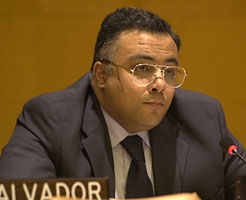 |
 Egypt
warned against moral obligations that can be circumvented and
the loss of credibility of the multilateral system. He noted the
absence of good governance at the international level, and called
for North-South solidarity toward achieving sustainable development
and poverty eradication. CHINA cautioned that globalization can
enhance developing countries' dependence on developed countries,
stated that environmental problems should not be solved through
market mechanisms and noted the gap between donor interests and
developing country needs in international cooperation.
Egypt
warned against moral obligations that can be circumvented and
the loss of credibility of the multilateral system. He noted the
absence of good governance at the international level, and called
for North-South solidarity toward achieving sustainable development
and poverty eradication. CHINA cautioned that globalization can
enhance developing countries' dependence on developed countries,
stated that environmental problems should not be solved through
market mechanisms and noted the gap between donor interests and
developing country needs in international cooperation. |
 Sweden,
for the EU and associated countries, said the overall effect
of international trade and capital flows on sustainable development
will depend on whether globalization and economic growth result in
social benefits and more eco-efficient resource allocation, or in
marginalization of the poor and additional pressure on scarce environmental
resources. He emphasized that improved market access and a strengthened
multilateral trading system are key to achieving economic development
for developing countries.
Sweden,
for the EU and associated countries, said the overall effect
of international trade and capital flows on sustainable development
will depend on whether globalization and economic growth result in
social benefits and more eco-efficient resource allocation, or in
marginalization of the poor and additional pressure on scarce environmental
resources. He emphasized that improved market access and a strengthened
multilateral trading system are key to achieving economic development
for developing countries. |
 China
cautioned that globalization can enhance developing countries' dependence
on developed countries, stated that environmental problems should
not be solved through market mechanisms and noted the gap between
donor interests and developing country needs in international cooperation.
China
cautioned that globalization can enhance developing countries' dependence
on developed countries, stated that environmental problems should
not be solved through market mechanisms and noted the gap between
donor interests and developing country needs in international cooperation.
|
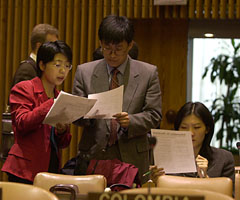
|
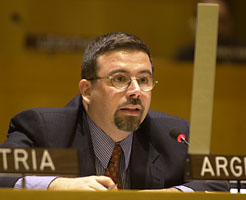 |
 Argentina
underscored the negative impact of subsidies on developing
countries and sustainable development. He noted distortions, such
as those created by agricultural subsidies, have damaged the environment.
He said the multilateral trade system can provide an enabling environment
if, inter alia, developed countries eliminate discriminatory trade
practices and non-tariff trade barriers.
Argentina
underscored the negative impact of subsidies on developing
countries and sustainable development. He noted distortions, such
as those created by agricultural subsidies, have damaged the environment.
He said the multilateral trade system can provide an enabling environment
if, inter alia, developed countries eliminate discriminatory trade
practices and non-tariff trade barriers. |
|
Indonesia
and India
|
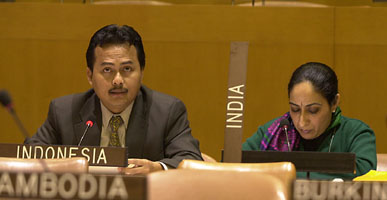
|
 Indonesia
called for a stable and dynamic trade environment and for debt
relief. He noted globalization is resulting in the marginalization
of developing countries and deepening the inequalities, and said
that total ODA has fallen below UN targets. He added that preferential
treatment in trade can increase investments and incomes and can
contribute to sustained economic growth and environment protection.
Indonesia
called for a stable and dynamic trade environment and for debt
relief. He noted globalization is resulting in the marginalization
of developing countries and deepening the inequalities, and said
that total ODA has fallen below UN targets. He added that preferential
treatment in trade can increase investments and incomes and can
contribute to sustained economic growth and environment protection.
 India
said that
even if poverty eradication and development were the primary responsibility
of developing countries, they could not achieve these goals without
provision of new and additional resources. She supported a non-discriminatory,
open and fair trading system, increased market access for goods
from developing countries, common but differentiated responsibilities
and meeting ODA targets.
India
said that
even if poverty eradication and development were the primary responsibility
of developing countries, they could not achieve these goals without
provision of new and additional resources. She supported a non-discriminatory,
open and fair trading system, increased market access for goods
from developing countries, common but differentiated responsibilities
and meeting ODA targets.
|
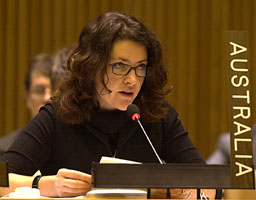 |
 Australia
stated that ODA
plays a catalytic and complementary role to private sector resources
in achieving development objectives. She identified the UN Framework
Convention on Climate Change clean development mechanism and the Global
Environment Facility as increasingly valuable tools for sustainable
development.
Australia
stated that ODA
plays a catalytic and complementary role to private sector resources
in achieving development objectives. She identified the UN Framework
Convention on Climate Change clean development mechanism and the Global
Environment Facility as increasingly valuable tools for sustainable
development. |
 Saudi
Arabia highlighted:
improved market access for developing countries; taxes to reflect
carbon content; technology transfer; and a timetable for achieving
UN targets for ODA.
Saudi
Arabia highlighted:
improved market access for developing countries; taxes to reflect
carbon content; technology transfer; and a timetable for achieving
UN targets for ODA.
|
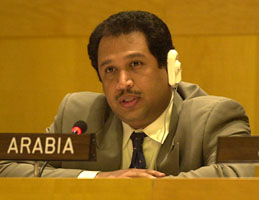 |
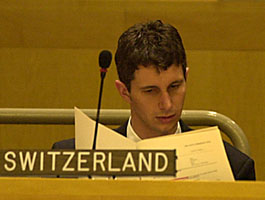 |
 Stressing the three pillars
of sustainable development, Switzerland
said globalization and trade liberalization should be accompanied
by environmental protection and social justice. He highlighted the
priority action areas for an enabling environment, such as: cleaner
production in developing countries; market access; debt relief;
and private financial flows. He said national action in governance,
public expenditure allocation to sustainable development, and coordination,
including the strengthening of the global environmental architecture.
Stressing the three pillars
of sustainable development, Switzerland
said globalization and trade liberalization should be accompanied
by environmental protection and social justice. He highlighted the
priority action areas for an enabling environment, such as: cleaner
production in developing countries; market access; debt relief;
and private financial flows. He said national action in governance,
public expenditure allocation to sustainable development, and coordination,
including the strengthening of the global environmental architecture.
|
 Nigeria
highlighted
the marginalization of developing countries due to globalization
and the volatility of private financial flows. He noted the overall
trend of international aid has declined substantially, resulting
in lower budgets for the UNDP and other UN agencies involved in
development, and said private sector involvement and public participation
cannot change the status quo if new and additional resources are
not mobilized. He said developed countries have proven they have
the capacity, if not the will, to help developing countries and
to create partnerships with their private sectors and civil societies.
He further said it was "futile" to require developing countries
to create an enabling environment as they lack the power to influence
the decisions taken in Bretton Woods institutions.
Nigeria
highlighted
the marginalization of developing countries due to globalization
and the volatility of private financial flows. He noted the overall
trend of international aid has declined substantially, resulting
in lower budgets for the UNDP and other UN agencies involved in
development, and said private sector involvement and public participation
cannot change the status quo if new and additional resources are
not mobilized. He said developed countries have proven they have
the capacity, if not the will, to help developing countries and
to create partnerships with their private sectors and civil societies.
He further said it was "futile" to require developing countries
to create an enabling environment as they lack the power to influence
the decisions taken in Bretton Woods institutions.
|
 |
 |
Brazil
welcomed South-South cooperation and stressed the need to: address
unsustainable patterns of production and consumption; improve the
share of financial resource flows; and turn trade into a powerful
tool for growth. |
|
Norway
said the global consensus on goals should meet with increasing ODA,
and said Norway aims to increase its ODA to one percent of gross
national product (GNP). He called for debt relief without compromising
aid budgets and for the CSD to coordinate with the Third Conference
on Least Developed Countries (LDC III) and the Financing For Development
conference. Regarding national responsibility in creating an enabling
environment, he stressed: the importance of national sustainable
development strategies and stakeholder input; the need for a supportive
macro-economic framework, institutions, and policy framework on
trade; and good governance and social infrastructure, as well as
support for access to information, financial resources and capacity
building.
|
|
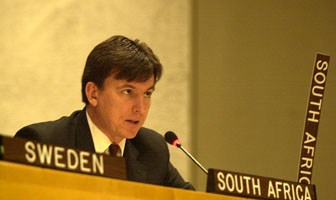 |
 South
Africa highlighted
the negative effects of globalization, and called for, inter alia:
sustainable mobilization of finance; more effective debt-relief measures
and accelerated debt reduction; a timeframe to meet ODA targets; improved
access to markets bilaterally and through the conclusion of a new
round of negotiations; involvement of IFIs as investors in key economic
infrastructure to leverage the private sector; and strategic partnerships
that involve civil society and the private sector.
South
Africa highlighted
the negative effects of globalization, and called for, inter alia:
sustainable mobilization of finance; more effective debt-relief measures
and accelerated debt reduction; a timeframe to meet ODA targets; improved
access to markets bilaterally and through the conclusion of a new
round of negotiations; involvement of IFIs as investors in key economic
infrastructure to leverage the private sector; and strategic partnerships
that involve civil society and the private sector. |
|
 Canada
said
CSD-9 can enhance ongoing debates on improving the reach and effectiveness
of international cooperation and should seek to better understand
how globalization is impacting international policies and programmes
on sustainable development and international cooperation. She
said CSD-9 could note that international development cooperation
increasingly includes areas that were treated in isolation and
requires policy coherence across traditionally separate disciplines,
and that LDC III and the Financing For Development conference
provide opportunities for addressing such coherence.
Canada
said
CSD-9 can enhance ongoing debates on improving the reach and effectiveness
of international cooperation and should seek to better understand
how globalization is impacting international policies and programmes
on sustainable development and international cooperation. She
said CSD-9 could note that international development cooperation
increasingly includes areas that were treated in isolation and
requires policy coherence across traditionally separate disciplines,
and that LDC III and the Financing For Development conference
provide opportunities for addressing such coherence.
|
|
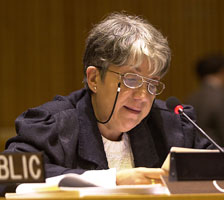 |
 Noting
that inequitable market access and protectionist barriers constrain
sustainable development, Cuba
called for
the realization of ODA targets, measures to find a lasting solution
to the debt problem and the elimination of the structural causes
of debt for both low- and middle-income countries.
Noting
that inequitable market access and protectionist barriers constrain
sustainable development, Cuba
called for
the realization of ODA targets, measures to find a lasting solution
to the debt problem and the elimination of the structural causes
of debt for both low- and middle-income countries.
|
|
|
 The International
Indian Treaty Council underscored the value of traditional
knowledge, and called on governments and relevant UN agencies and
processes to, inter alia: observe the principle of prior informed
consent in all traditional knowledge research; and strengthen Indigenous
Peoples' in situ forms of traditional knowledge registration and protection,
as well as their customary laws, rather than impose a strict regime
of intellectual property rights.
The International
Indian Treaty Council underscored the value of traditional
knowledge, and called on governments and relevant UN agencies and
processes to, inter alia: observe the principle of prior informed
consent in all traditional knowledge research; and strengthen Indigenous
Peoples' in situ forms of traditional knowledge registration and protection,
as well as their customary laws, rather than impose a strict regime
of intellectual property rights. |
Information for Decisions: From
Data to Information to Knowledge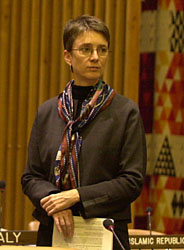
Australia
hosted a side event titled, "Information for Decisions, From Data
to Information to Knowledge," at which Tricia Kaye, Director,
Australian Environmental Resources Information Network (left),
and Mark Hyman, Assistant Secretary, International and Intergovernmental
Issues in Relation to the Environment (below right), presented
an Australian initiative to establish a multipurpose database
that could be used by civil society and the private sector to
make various policy decisions. They outlined work undertaken in
the last decade to collect, assess and utilize baseline information
on the country's ecosystem in order to provide information solutions
for data-poor environments. Using seven different case studies,
they demonstrated how the data gathered is used by stakeholders
and four key lessons to be retained: the need to define goals
and information requirements before establishing such an initiative;
the need to develop a framework using information standards; the
need for information to serve multiple purposes; and the need
to involve stakeholders and develop cooperative frameworks in
order to guarantee access.
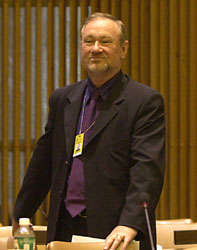 The
following seven case studies were used to illustrate experiences
at local, regional and national scales:Environment Protection
and Biodiversity Conservation (rapid and transparent assessment
to meet decision outcomes); Carbon Accounting (significantly advancing
world knowledge on land based sources and sinks); Pollutant Inventory
(basic information about industry and non-industry knowledge);
Air Quality Forecasting System (modelling emission to analyse
local effects); Land and Water Resources Audit (where are our
land degradation/salinity hotspots and what is causing them);
Regional Forest Agreements (bringing stakeholders and information
together to get the best possible outcome for conservation and
development); and Sustainable Fisheries (stakeholders drive and
managing the process). Conclusions
regarding the most important actions on information for decisions
are: defining goals and requirements; developing a decision support
framework using information standards; collecting information
for multiple purposes; and involving stakeholders and ensuring
access. The
following seven case studies were used to illustrate experiences
at local, regional and national scales:Environment Protection
and Biodiversity Conservation (rapid and transparent assessment
to meet decision outcomes); Carbon Accounting (significantly advancing
world knowledge on land based sources and sinks); Pollutant Inventory
(basic information about industry and non-industry knowledge);
Air Quality Forecasting System (modelling emission to analyse
local effects); Land and Water Resources Audit (where are our
land degradation/salinity hotspots and what is causing them);
Regional Forest Agreements (bringing stakeholders and information
together to get the best possible outcome for conservation and
development); and Sustainable Fisheries (stakeholders drive and
managing the process). Conclusions
regarding the most important actions on information for decisions
are: defining goals and requirements; developing a decision support
framework using information standards; collecting information
for multiple purposes; and involving stakeholders and ensuring
access.
Photos:
Tricia Kaye (above left) and Mark Hyman (right)
For more
information, visit Environment Australia at http://www.environment.gov.au
Also check
out the following websites: The
Environment Protection and Biodiversity Conservation Database
http://www.environment.gov.au/epbc;
National Land and Water Resources Audit http://www.nlwra.gov.au;
National Pollutant Inventory www.npi.ea.gov.au;
Australian Greenhouse Office www.greenhouse.gov.au;
National Reporting Framework for Australian Fisheries http://www.brs.gov.au;
Australian Air Quality Forecasting System http://www.dar.csiro.au/info/AAQFS
|
In the ensuing
discussion, participants inquired about: the institutional framework
within which the initiative falls; the human resource capacity;
the total cost of the 10-year initiative; the challenges faced
in establishing the network; and whether the initiative has resulted
in behavior change. Responding, the presenters said the initiative
falls within an intergovernmental authority and the national environment
strategy, has 30 staff members and costs between AUS$1-2 million
annually, with additional human resource and finances incurred
by collaborating institutions. They said it is still early to
determine whether behavior has changed, although there is evidence
of a more positive attitude among companies required to submit
reports. They said the main challenges have been the inability
to address technological aspects due to cost and reaching agreement
with the other players on a cooperative framework.
Photo:
Tricia Kaye and Penny Wensley of the Australian delegation
|
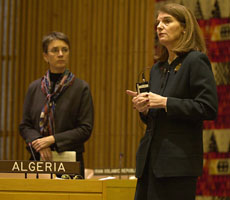 |
|
RELATED
LINKS
Past
IISD Coverage:
|
|


